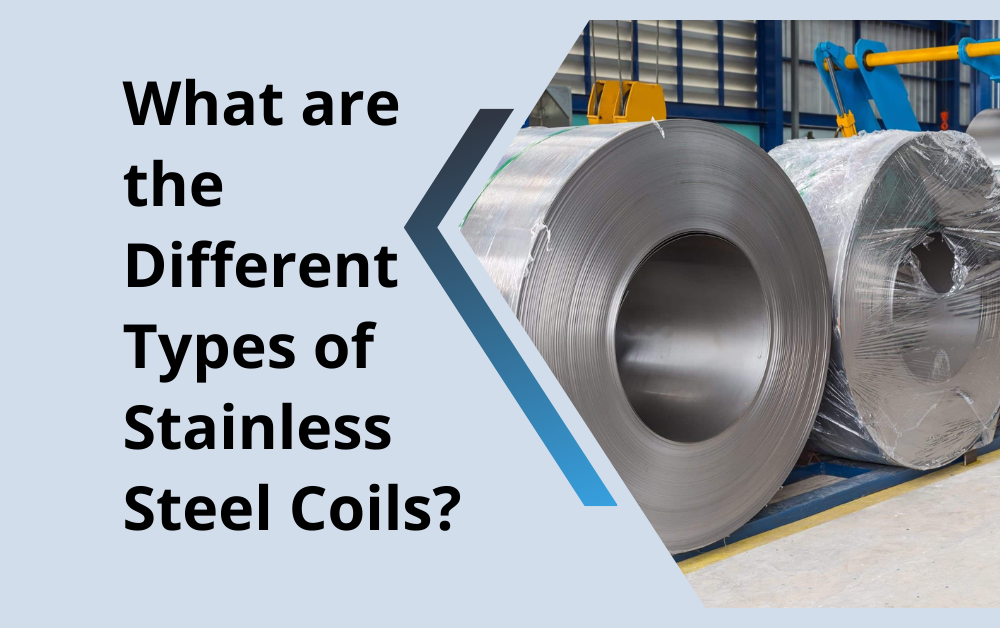Stainless steel is a popular material known for its strength, durability, and resistance to rust. One common form in which stainless steel is used is in coils. These coils have a wide range of applications across various industries. In this blog, we will explore the different types of stainless steel coils and their uses.
Understanding Stainless Steel
What is Stainless Steel?
Stainless steel is a type of steel that contains chromium, which makes it resistant to rust and stains. It is also known for its shiny appearance and ability to withstand high temperatures. Stainless steel is used in many products, from kitchen appliances to construction materials.
Why Choose Stainless Steel?
Stainless steel is chosen for its many benefits. It is durable, meaning it lasts a long time without needing to be replaced. It is also easy to clean, which makes it perfect for use in kitchens and hospitals. Moreover, stainless steel does not rust, making it ideal for outdoor use.

Types of Stainless Steel Coils
There are several types of stainless steel coils, each with unique properties. These types are categorized based on their composition and the processes they undergo during manufacturing.
Austenitic Stainless Steel Coils
What Are Austenitic Stainless Steels?
Austenitic stainless steels are the most common type of stainless steel. They contain high levels of chromium and nickel, which give them their corrosion-resistant properties. They are non-magnetic and have excellent formability and weldability.
Uses of Austenitic Stainless Steel Coils
- Kitchen Equipment: These coils are used in making sinks, countertops, and other kitchen equipment because they do not rust and are easy to clean.
- Medical Instruments: Due to their high hygiene standards, austenitic stainless steels are used in surgical instruments and medical devices.
- Automotive Parts: They are also used in car parts that require both strength and resistance to rust.
Ferritic Stainless Steel Coils
What Are Ferritic Stainless Steels?
Ferritic stainless steels have lower chromium content compared to austenitic steels. They are magnetic and have good corrosion resistance. They are also known for their high resistance to stress corrosion cracking.
Uses of Ferritic Stainless Steel Coils
- Automotive Exhaust Systems: Ferritic stainless steels are commonly used in the automotive industry for exhaust systems because they can withstand high temperatures.
- Industrial Equipment: These steels are used in industrial applications where high corrosion resistance is needed, such as in chemical plants.
- Household Appliances: Ferritic stainless steel coils are also used in the production of washing machines, dishwashers, and other household appliances.
Martensitic Stainless Steel Coils
What Are Martensitic Stainless Steels?
Martensitic stainless steels contain higher levels of carbon and lower levels of chromium. They are known for their hardness and strength but have lower corrosion resistance compared to austenitic and ferritic steels. They are magnetic and can be heat-treated for added strength.
Uses of Martensitic Stainless Steel Coils
- Cutlery and Tools: Martensitic stainless steels are used to make knives, scissors, and other cutting tools due to their hardness and sharpness.
- Surgical Instruments: Some surgical instruments are made from martensitic stainless steel because they need to be very strong and sharp.
- Valves and Pumps: These steels are used in the manufacture of valves and pumps in industries where high strength is required.
Duplex Stainless Steel Coils
What Are Duplex Stainless Steels?
Duplex stainless steels have a mixed microstructure of austenite and ferrite. This gives them a combination of the good properties of both types of stainless steel. They have higher strength and better corrosion resistance than both austenitic and ferritic stainless steels.
Uses of Duplex Stainless Steel Coils
- Oil and Gas Industry: Duplex stainless steel coils are used in the oil and gas industry for pipes and tanks because of their high strength and excellent corrosion resistance.
- Chemical Processing: These coils are also used in the chemical industry where both high strength and resistance to corrosion are essential.
- Construction: Duplex stainless steels are used in the construction of bridges and buildings due to their strength and durability.
Note:- Are you looking for high-quality stainless steel coils for your next project? Discover the perfect solution for your needs with our wide range of stainless steel coils. Whether you need durability, corrosion resistance, or high strength, we have the right type of stainless steel coil to meet your requirements. Contact us today to learn more about our products and how we can help you achieve excellence in your projects. Don’t wait—enhance your applications with the best stainless steel coils on the market.
Precipitation-Hardening Stainless Steel Coils
What Are Precipitation-Hardening Stainless Steels?
Precipitation-hardening stainless steels contain elements such as copper, niobium, and aluminum. These elements allow the steel to be hardened through heat treatment. They offer a combination of high strength and good corrosion resistance.
Uses of Precipitation-Hardening Stainless Steel Coils
- Aerospace Industry: These steels are used in the aerospace industry for making parts that need to be both strong and lightweight.
- Nuclear Reactors: Precipitation-hardening stainless steels are used in nuclear reactors due to their high strength and ability to withstand radiation.
- High-Performance Gears and Shafts: These steels are also used in high-performance applications such as gears and shafts that require both strength and resistance to wear and tear.
How Stainless Steel Coils Are Made
Raw Materials
The main raw materials used in making stainless steel coils are iron ore, chromium, nickel, and other alloying elements. These materials are melted together in a furnace to form a molten alloy.
Casting
The molten alloy is then cast into a solid form. This can be done through continuous casting, where the molten metal is poured into a mold and solidified into a long slab, or through ingot casting, where the molten metal is poured into individual molds.
Hot Rolling
The solidified metal is then heated and passed through a series of rolling mills to form a thin, flat strip. This process is known as hot rolling. The hot-rolled strip is then cooled and coiled.
Cold Rolling
The hot-rolled coil is further processed through cold rolling, where it is passed through rolling mills at room temperature. This process makes the steel thinner and improves its surface finish and mechanical properties.
Annealing
After cold rolling, the steel coil is annealed, which involves heating it to a high temperature and then cooling it slowly. This process relieves internal stresses and improves the steel’s ductility.
Surface Finishing
The final step in making stainless steel coils is surface finishing. This can include processes such as pickling, where the coil is dipped in acid to remove any scale or oxide, and polishing, where the coil is given a smooth, shiny finish.
Benefits of Using Stainless Steel Coils
Durability
Stainless steel coils are very durable and can last for many years without needing to be replaced. They can withstand high temperatures and are resistant to wear and tear.
Corrosion Resistance
One of the main benefits of stainless steel coils is their resistance to rust and corrosion. This makes them ideal for use in environments where they will be exposed to moisture or chemicals.
Strength
Stainless steel coils are very strong and can withstand heavy loads and high stresses. This makes them suitable for use in construction, automotive, and industrial applications.
Versatility
Stainless steel coils can be used in a wide range of applications, from kitchen appliances to industrial equipment. They can be easily formed and welded, making them highly versatile.
Aesthetic Appeal
Stainless steel has a shiny, attractive appearance that makes it popular for use in architectural and decorative applications. It can be polished to a high shine or given a brushed finish for a more subtle look.
Choosing the Right Stainless Steel Coil
When choosing a stainless steel coil, it is important to consider the specific requirements of your application. Factors to consider include:
Corrosion Resistance
If the coil will be used in an environment where it will be exposed to moisture or chemicals, it is important to choose a type of stainless steel with high corrosion resistance, such as austenitic or duplex stainless steel.
Strength
For applications that require high strength, such as construction or automotive parts, it is important to choose a type of stainless steel that offers high strength, such as martensitic or precipitation-hardening stainless steel.
Formability
If the coil needs to be easily formed or welded, it is important to choose a type of stainless steel with good formability and weldability, such as austenitic stainless steel.
Cost
Different types of stainless steel have different costs, so it is important to consider your budget when choosing a stainless steel coil. Austenitic stainless steels are generally more expensive than ferritic or martensitic stainless steels.
Conclusion
Stainless steel coils are a versatile and durable material that can be used in a wide range of applications. Understanding the different types of stainless steel coils and their properties can help you choose the right coil for your needs. Whether you need a coil for kitchen equipment, industrial machinery, or construction, there is a type of stainless steel that will meet your requirements.
Stainless steel coils offer many benefits, including durability, corrosion resistance, strength, versatility, and aesthetic appeal. By choosing the right type of stainless steel coil for your application, you can ensure that you get the best performance and value for your investment.
For more insightful articles related to this topic, feel free to visit relxnn.com









